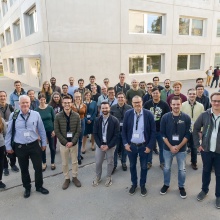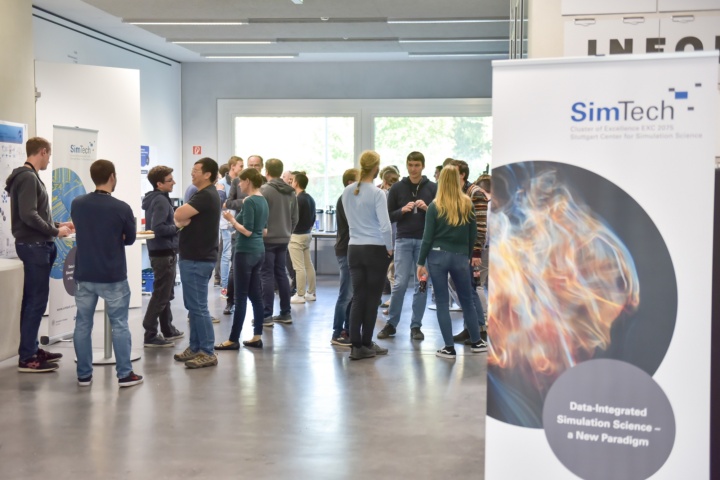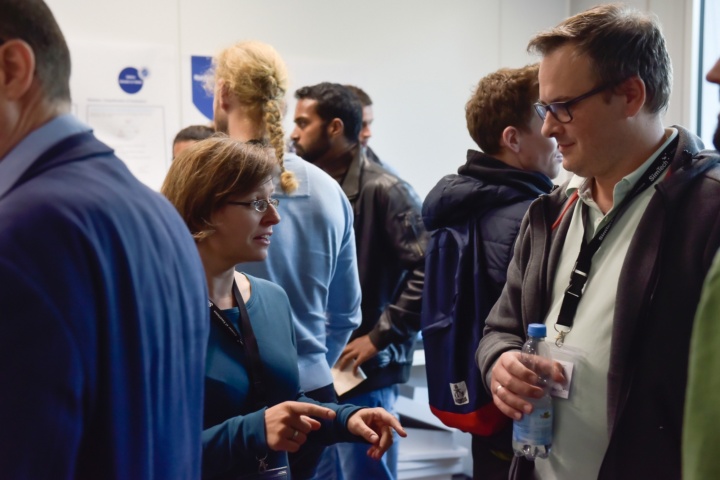At the beginning of October, more than 40 participants from the SimTech, the Robert Bosch GmbH, the University of Stuttgart and other universities such as Heidelberg, Kassel and Jena came to together for the first “Maths Meets Industry” workshop, a joint event of the Robert Bosch GmbH and the Stuttgart Cluster of Excellence SimTech - organized by Christian Rohde, Jörg Fehr, Uwe Iben, Veronika Schleper and Michael Schick.
Common ground of the institutions is the shared importance of simulations in their research. The Cluster of Excellence SimTech has a leading position in the field of data-integrated simulation science. At the same time, simulation plays also an outstanding role for the Robert Bosch GmbH. "We have a continuous need to drive our business forward by developing new products or by automating production process. Digital Twins refer to virtual simulation models of components or products which are capable of imitating the use and properties in real time. The models also authentically simulate the product’s natural user environment and its handling. Therefore, the importance of simulation is constantly increasing“, underlines Uwe Iben, Chief Expert Applied Mathematics at Bosch.
Thus, main purpose of the workshop was a mutual exchange of results in up-to-date research projects and the identification of joint research topics related to fundamental mathematical and computational methods, important pillars of computer-based simulations.
To achieve said goal, researchers from Bosch and SimTech presented their research in keynote lectures. The lectures included talks on topics such as uncertainty quantification, computational statistics, data-integrated numerical simulation and high-performance computing as well as model order reduction and surrogate modelling. Many of the lectures focused particularly on machine learning topics in the widest sense - one of the most prominent research areas in computational science these days.
Additionally, the workshop aimed at strengthening contacts between the doctoral researchers of SimTech’s Graduate School (GS SimTech) as well as undergraduates and Bosch researchers, giving the workshop a purpose beside its strictly scientific goals. For this, doctoral researchers were encouraged to present their research by competing in a science slam. The science slam was won by Patrick Buchfink with his presentation about “monsters and MORe” (MOR is short for “model order reduction”). Buchfink is a former student of SimTech’s study program Simulation Technology, and now a doctoral researcher at the Institute of Applied Analysis and Numerical Simulations (IANS).
Christian Rohde, member of the SimTech Board of Directors and one of the event initiators and organizers, was impressed by the work of doctoral researchers and students. "The enthusiastic presentations of the young scientists marked the highlight of the workshop. In turn, the lectures from industry showed that their work can have impact to the solution of real-world problems."
The talks given sparked intensive exchanges during the breaks, which will potentially be continued in some form in future collaborations between SimTech and Bosch, developing from the foundations built by this workshop. Sustainable exchange between science and industry therefore is crucially important. In SimTech this exchange is channelled by the Industrial Consortium SimTech e. V. which was represented by Jörg Fehr, PR in SimTech and member of the SimTech Committee for Knowledge Transfer, during the workshop.




